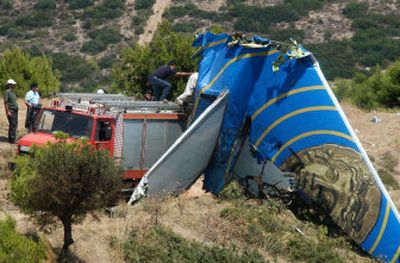Crash confounds investigators

ATHENS, Greece – Initial autopsies showed that at least six of the 121 people aboard a Cypriot plane were alive but not necessarily conscious when the aircraft crashed while on autopilot, a coroner said Monday, as authorities struggled to explain the actions of the pilot and crew.
The results of the first six autopsies shed some light on the final minutes of Helios Airlines Flight ZU522, which crashed Sunday into a hillside in suburban Athens, killing all 115 passengers and six crew members. But they failed to answer all the questions.
In Larnaca, the Cypriot city where the flight took off, police raided the offices of Helios Airlines, seeking “evidence which could be useful for the investigation into possible criminal acts,” said Cypriot deputy presidential spokesman Marios Karoyian.
Greek aviation officials have said the plane apparently lost pressure suddenly, causing a rapid loss of oxygen on board. In that case, passengers and flight crew would have had only seconds to put on oxygen masks before losing consciousness amid subzero temperatures. Death would be minutes behind.
But two fighter jet pilots who scrambled to intercept the plane saw the co-pilot slumped over, oxygen masks in the plane dangling, and two unidentified people trying to take control of the plane. The pilot was not in his seat when the plane crashed, about 2 1/2 hours after the crew first radioed in air conditioning problems, officials said.
The fire department has said none of the bodies had masks on their faces.
“It’s odd,” said Terry McVenes, executive air safety chairman for the Air Line Pilots Association, International. “It’s a very rare event to even have a pressurization problem and in general crews are very well trained to deal with it.”
Greek and Cypriot officials have ruled out terrorism as a cause of the crash.
Investigators, to be joined by U.S. experts, were sending the plane’s data and cockpit voice recorders to France for expert examinations.
But the head of the Greek airline safety committee, Akrivos Tsolakis, said the voice recorder was damaged. “It’s in a bad state and, possibly, it won’t give us the information we need.”